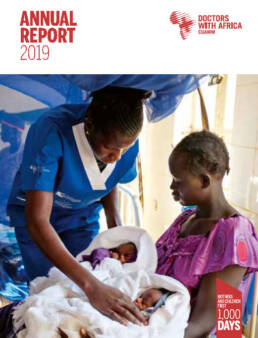
I look back over the many experiences, stories, struggles, joys of a whole year and am pleased to share with you a few thoughts from the various field missions in Africa and numerous meetings held in Italy.
I think about the town of Tete, in one of the poorest and most rural areas of Mozambique. In early March, I paid a visit to the provincial hospital. Its Clinical Director Dr Mauro Hernani Monteiro welcomed me with a hug and smile, with a warmth that took me somewhat by surprise. “10 years ago, I received a scholarship from CUAMM to enrol and study at the Catholic University in Beira and become a doctor!”, he told me, “thank you very much. Now I’m proud and excited to use what I’ve learned to serve my people and this important hospital”. It was truly a joy; a little piece of the future we want to build together.
I’d like to extend Mauro’s “thanks” to the many individuals who have so generously supported us this year, in so many ways. A few days after this meeting, Cyclone Idai struck Mozambique, in the city of Beira and Cabo Delgado soon after. It was a time of great concern, as the disaster affected around 700,000 people in Beira, Dondo and Nyamathanda, bringing with it death and destruction.
We have been operating in Beira for more than twenty years, and in Mozambique for forty; it caused us unspeakable pain to see the places that we helped grow being destroyed by the forces of nature. But we learned the patience to “rebuild” infrastructure – with an entire healthcare system – as well as to rebuild confidence in the hearts of those who were exhausted and weighed down by the destruction of what had been built over so many years.
I think of Aber Hospital, Diocese of Lira, in Oyam district, north-central Uganda. It was here in 1965 where the first CUAMM doctor began to work, followed by many others. Now the hospital is much more autonomous and after 54 years, despite some inevitable weak points, it continues to serve its people, mothers and children in particular. I think of Sierra Leone, where the 118 service was created. The 80 ambulances are largely operational across the country’s districts, a call centre answers every call, and training for almost 1,600 people, including drivers and nurses is now in full swing. The ambulances in Sierra Leone reached everyone, even the most isolated and abandoned areas of the country, 24 hours a day, including Saturdays and Sundays. Upholding rights takes more than words, it takes ideas, effort, work and passion.
In the Central African Republic, our volunteers have worked flat out, with perseverance and dedication, in the Bangui paediatric complex. It was here that the new centre for malnourished children was opened by Pope Francis during the inauguration of the Holy Door, and where the Bambino Gesù Children’s Hospital was built. A great deal has been done, and a great deal remains to be done, especially in the more rural areas of the country.
I think about Gambella in Ethiopia, the western area of the country, towards the border with South Sudan. In the camps, the number of South Sudanese refugees has decreased from half a million to 300,000.
Those dealing with the first emergency left the camp to organisations like CUAMM, which focused more on integration and development. Here, we continued our work to support the local population, restoring health centres and getting them up and running, providing equipment and doctorsne, training the local staff and setting up the ambulance system for emergencies, particularly obstetric emergencies.
I think of South Sudan, a country which remains difficult and uncertain, steeped in tension and insecurity. Extremely low wages, widespread poverty, fragile institutions, nonexistent services, and Ebola around the corner. And yet, here, we have gone to great extent to build hope in a future that is struggling to materialise.
So, albeit with a lot of hard work, we have been able to reopen schooling activities for the midwives at Lui Hospital. On the day of the inauguration, we were all there together, determined to achieve this great result: government, churches, humanitarian organisations, communities. Together with CUAMM, there was Health Minister Riek Gai Kok, the Welfare Minister, the Regional Governor, the Bishop of the Episcopal Church, and all representatives of the local community. Africa, and the wider world more broadly, does not need heroes or world saviours. It is in urgent need of ordinary, everyday people, who are adamant about doing their duty and doing it well.
That is why we have mobilised in every way possible, even in our own country, putting on dozens of meetings and events. It’s why we launched the #lostessofuturo [the same future] hashtag campaign, and why so many of us gathered in Florence on 9 November. It is hard to describe the feelings of that time in just a few lines: astonishment and gratitude, trust and beauty, marvel and perseverance in doing good. Lostessofuturo [the same future] is denied to so many women and children in Africa – the future that we are committed to building and rebuilding every day in the field. A broken red thread which is pieced back together through our personal and daily commitment. Only this way can we build a single future that is richer and more beautiful for everyone. Every year. (Introduction by don Dante Carraro, Director of Doctors with Africa CUAMM)
……………
Source: Doctors with Africa CUAMM
Annual Report 2019: Website
